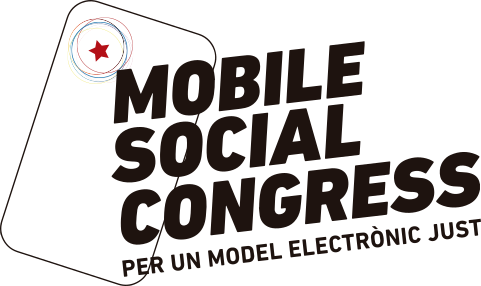
- The protest was held the day before the start of the Mobile Social Congress in Barcelona, which will present different points of view on practices in the electronics industry silenced by the MWC
- Among other lectures and studies, the Congress will include the presentation of a report by Electronics Watch on the connection between suicide and working conditions in the electronics industry in China
This Monday morning, a protest action promoted by SETEM Catalunya denounced inhuman working conditions in the electronics industry. The protest took place at the entrance to the Mobile World Congress (MWC) as the event opened its doors. In collaboration with several Catalan and European organizations, SETEM also organizes the Mobile Social Congress (MSC), held this Tuesday the 26th and Wednesday the 27th at Pati Manning in Barcelona. The MSC seeks to present aspects of the tech industry that are silenced at the MWC, such as the serious social and environmental impact of the current model of production and consumption. However, it also seeks to present experiences, organizations and groups that work towards technological sovereignty with a more sustainable model.
The protest held this Monday morning consisted of a performance on labour exploitation in the industry, focusing on the exaggerated consumerism promoted at events like the MWC. Nevertheless, MSC coordinator Laia Fargas Fursa insists that the event is neither “an ‘anti-MWC’ nor the social side of the Mobile World Congress. It’s a space for citizens to come together and reflect on the way information and communication technologies are produced and consumed. Our current model involves serious violations of human rights, especially labour rights, and has serious environmental impacts that are hidden at the Mobile World Congress.”
This Monday and Tuesday, MSC participants from different regions of the world will present a number of studies on the social and electronic impact of the current model for the production and consumption of electronics. One of the studies presented on Tuesday will discuss the focus of Monday’s protest at the entrance to the MWC: a recent report by Electronics Watch analyses the connection between suicide and working conditions at electronics manufacturers in China.
A comprehensive look at the impacts of the electronics industry’s full supply chain, from the mine to the dump
The 2019 Mobile Social Congress will take an all-around look at the impacts of the electronics industry’s supply chain, from the mines where raw materials are obtained to the dumps where most devices end up shortly after being sold. The guiding thread of this year’s MSC will be “modern slavery” or “slavery 2.0”: special emphasis will be placed on the industry’s environmental impact, as well as its social impact on workers. One of the reports presented this year focuses on the connection between the risk of suicide among those working in the electronics industry in China and the precarious working conditions in the factories that provide for the world’s main electronics brands. The Congress will also look at the erosion of workers’ rights in European countries where the industry has a significant presence, such as Hungary or the Czech Republic.
On February 26, the MSC will start with a showing of the documentary Projecte Mòbil (Mobile Project) and a round table presenting reports on the social and environmental impact of mining in Chile, Armenia and Zambia. This first day of the Congress will focus on working conditions in the electronics industry and their connection to suicide among Chinese factory workers, as well as the erosion of workers’ rights in Eastern Europe. A simultaneous “restart party” and “install party” will also be held, with teams specialized in repair and installation using different free software tools. Participants will learn how to lengthen the lifespan of their electronic devices, as well as how to take back control of communications and data using free software.
Day two of the MSC will focus on the potential of responsible public purchasing in demanding that the electronics industry respect workers’ rights. The Congress will examine positive initiatives from different public administrations, including the Barcelona City Council. In addition, it will look at examples of collaboration between the solidarity economy, companies and the public sector to promote the reuse, repair and recycling of electronic devices. Finally, alternatives will be presented with a workshop on the responsible use of mobile phones, another on the co-creation of free cloud tools, and a third workshop with a role-playing game that will help participants learn to control the data we share over the internet.


